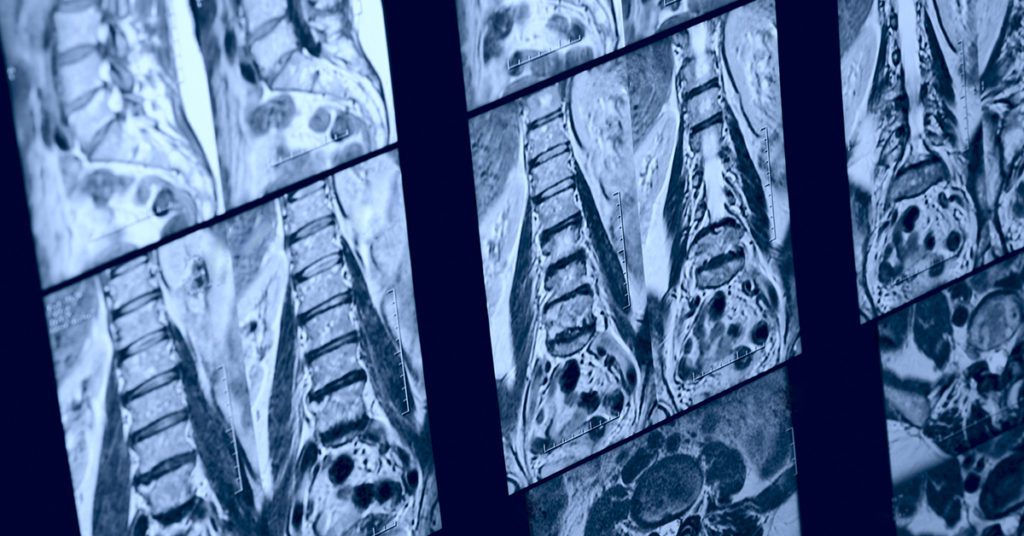According to the CDC, 25% of U.S. adults report having experienced low back pain in the past three months. Whether it’s caused by acute injury or the long-term impact of lifestyle choices, back pain can have a serious impact on your quality of life. Back pain can also be costly—it’s one of the most common reasons people miss work and file for worker’s compensation. Many people attempt to push through their low back pain without seeking treatment, but imaging exams, such as an MRI for back pain, can help determine the source of discomfort and help doctors find the right treatment.
Determining the source of back pain with MRI
Many patients develop sudden lower back pain as the result of a sprain or strain in the muscles, ligaments and tendons that support the spine. Back pain may also develop slowly and grow worse over time due to repeated heavy lifting on the job, poor posture, degenerative conditions, poor physical health, lack of exercise, and more. Depending on the exact location and severity of your back pain, your doctor may initially recommend physical therapy, changing how you sit, move or lift things, and over-the-counter medications before referring you for a diagnostic imaging study.
However, if your doctor does recommend imaging, that’s where MRI technology comes in. MRI scans for back pain capture images of soft tissues, including the disks that separate the vertebrae, the spinal cord, the muscles and connective tissue around the spine, and the nerves that run in and out of the spine.
An MRI for back pain helps doctors diagnose painful spine conditions, including:
- Compressed/herniated disks, which occur when the soft disks that cushion the vertebrae become weakened and rupture. Symptoms depend on the location of the disk and include discomfort when you move, numbness or weakness, and pain that shoots down your arm or leg.
- Misalignment of the spine, which can occur over time due to poor posture or bone density loss. It is associated with compression fractures.
- Sciatica, or pressure on the sciatic nerve that extends from your lower spine to the sole of your foot. This can cause symptoms of tingling or burning pain that shoots down the lower back through the buttock, leg and foot.
- Spinal stenosis, or a narrowing of the spinal canal. This condition may lead to sciatica. Symptoms include pain, numbness or weakness in the affected part of the back and related limbs. In more serious cases, spinal stenosis can cause problems with bladder and bowel function.
Touchstone Medical Imaging offers several imaging options that can provide insight into your lower back pain. Our MRI and CT scans typically cost 40% to 60% less than hospital imaging. Once you’ve obtained a doctor’s order, contact your local Touchstone Medical Imaging center to find the source of your back pain.
Multiple modes of pinpointing back pain
MRI isn’t the only imaging tool available to help determine the source of back pain. Doctors also use other imaging studies, including CT scans and X-rays, to diagnose painful spine conditions. Sometimes, one imaging scan is not enough. In these cases, your doctor may order two or more scans. These scans give a complete picture of your spine’s health. This fuller picture helps your doctor diagnose conditions ranging from arthritis to spinal stenosis.
Affordable answers to back pain
When you need an MRI for back pain, it’s important to get answers right away so your doctor can arrive at a correct diagnosis and effective treatment plan. Fortunately, Touchstone Medical Imaging offers cost-effective imaging services at a fraction of hospital imaging costs. As an added benefit, we’re in-network with most major health insurance plans. Instead of losing valuable work hours to lower back discomfort, find out what’s causing your back pain without interrupting your busy schedule.
Need an X-ray, CT or MRI for lower back pain? Touchstone Medical Imaging’s compassionate technologists perform an array of specialized imaging services at convenient hours. Talk with your doctor about your back pain. Then, with the doctor’s order, contact a Touchstone Medical Imaging center near you. By scheduling your scan today, you’re taking the first step toward tomorrow’s relief.

